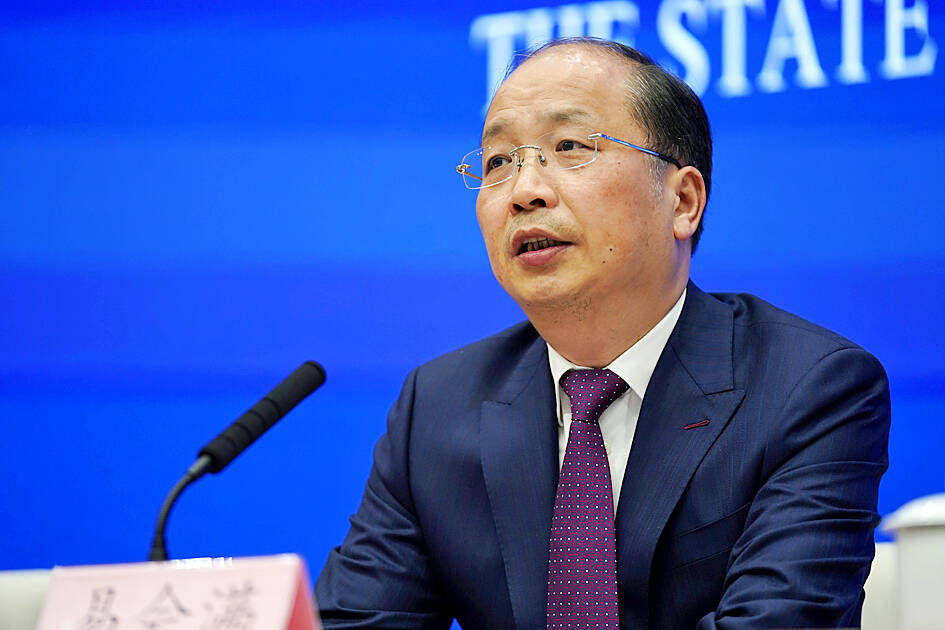China has removed the head of its top financial regulator, state media reported yesterday, after markets in the world’s second-largest economy have been among the worst-performing globally in recent months.
Beijing has become increasingly worried about the sell-off on markets in Shanghai and Hong Kong, which has wiped trillions off valuations, and has unveiled a string of measures to try to staunch the rout.
State broadcaster CCTV yesterday said the top leadership of the Chinese Communist Party removed Yi Huiman (易會滿) from his position as chief of China’s Securities Regulatory Commission (CSRC), the country’s top financial regulator.

Photo: EPA-EFE
That came a day after, according to Bloomberg, Chinese President Xi Jinping (習近平) was due to meet with regulators to discuss efforts to lift the markets.
Yi, a former chairman of the Industrial and Commercial Bank of China (中國工商銀行), was appointed to the top job at CSRC in January 2019.
Wu Qing (吳清), a banking and regulation veteran who earned the reputation as “the broker butcher” when he led a crackdown on traders in the mid-2000s, is replacing Yi, the official Xinhua News Agency reported.
China, which recorded one of its lowest growth rates in three decades last year at 5.2 percent, has been hammered by a crippling property crisis, sluggish consumption and global turmoil, and officials have been under pressure to unveil more stimulus measures to kickstart business activity and get consumers spending again.
On Tuesday, stocks in Hong Kong and Shanghai soared after Central Huijin Investment Ltd (中央匯金) — the unit that holds Chinese government stakes in major financial institutions — said it would increase investments in funds.
That was followed by an announcement from the CSRC that it would urge more action from long-term funds and call on listed firms to ramp up re-purchase.
Shanghai stocks extended their rally yesterday.

GROWING OWINGS: While Luxembourg and China swapped the top three spots, the US continued to be the largest exposure for Taiwan for the 41st consecutive quarter The US remained the largest debtor nation to Taiwan’s banking sector for the 41st consecutive quarter at the end of September, after local banks’ exposure to the US market rose more than 2 percent from three months earlier, the central bank said. Exposure to the US increased to US$198.896 billion, up US$4.026 billion, or 2.07 percent, from US$194.87 billion in the previous quarter, data released by the central bank showed on Friday. Of the increase, about US$1.4 billion came from banks’ investments in securitized products and interbank loans in the US, while another US$2.6 billion stemmed from trust assets, including mutual funds,

Micron Memory Taiwan Co (台灣美光), a subsidiary of US memorychip maker Micron Technology Inc, has been granted a NT$4.7 billion (US$149.5 million) subsidy under the Ministry of Economic Affairs A+ Corporate Innovation and R&D Enhancement program, the ministry said yesterday. The US memorychip maker’s program aims to back the development of high-performance and high-bandwidth memory chips with a total budget of NT$11.75 billion, the ministry said. Aside from the government funding, Micron is to inject the remaining investment of NT$7.06 billion as the company applied to participate the government’s Global Innovation Partnership Program to deepen technology cooperation, a ministry official told the

Taiwan Semiconductor Manufacturing Co (TSMC, 台積電), the world’s leading advanced chipmaker, officially began volume production of its 2-nanometer chips in the fourth quarter of this year, according to a recent update on the company’s Web site. The low-key announcement confirms that TSMC, the go-to chipmaker for artificial intelligence (AI) hardware providers Nvidia Corp and iPhone maker Apple Inc, met its original roadmap for the next-generation technology. Production is currently centered at Fab 22 in Kaohsiung, utilizing the company’s first-generation nanosheet transistor technology. The new architecture achieves “full-node strides in performance and power consumption,” TSMC said. The company described the 2nm process as

Even as the US is embarked on a bitter rivalry with China over the deployment of artificial intelligence (AI), Chinese technology is quietly making inroads into the US market. Despite considerable geopolitical tensions, Chinese open-source AI models are winning over a growing number of programmers and companies in the US. These are different from the closed generative AI models that have become household names — ChatGPT-maker OpenAI or Google’s Gemini — whose inner workings are fiercely protected. In contrast, “open” models offered by many Chinese rivals, from Alibaba (阿里巴巴) to DeepSeek (深度求索), allow programmers to customize parts of the software to suit their